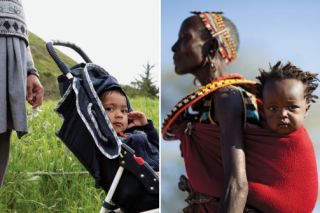Parenting
5 Best Stone Age Parenting Practices
What traditional societies can teach us about raising our children
Posted March 8, 2013

As parents we often wonder what is the best way to raise our children. Should we be more authoritative or permissive, conservative or liberal, punitive or non-punitive towards our children?
Luckily there is a whole literature of self-help books available for parents and parents-to-be in which experienced mothers and fathers or, better still, education professionals, discuss new models and techniques to bring up children. Just some examples of best-sellers in this genre are “Simplicity parenting: Using the extraordinary power of less to raise calmer, happier, and more secure kids” by consultants Kim John Payne and Lisa M. Rose. Or what to think of “Scream-free parenting: The revolutionary approach to raising your kids by keeping your cool” by Hal Edward Runkel. Undoubtedly there are many useful insights in these books that can address people’s’ real anxieties and make them become better parents.
As an evolutionary minded psychologist, and a father, it always struck me that parenting should be one of the things that we humans are naturally good at. I am the descendant of many generations of individuals, men and women, who have all done a reasonably job at parenting, otherwise I would simply not be here writing this blog. Maybe this explains why I never once read a self-help parenting book. It is true though that our way of parenting has probably changed quite a bit since our ancestors moved out of Africa. Our ancestors did not have to bring up their children in large and crowded cities, with many strangers abound, lots of traffic, material possessions, and vast differences in wealth between families.
Yet it interesting to find out more about how families in traditional societies raise their children because such societies are the ones in which humans lived in for generations and this may have resulted in particular parenting styles. Unfortunately, there is not a lot of research out there as most developmental psychologists (including theorists such as Piaget, Kohlberg and Freud) have tended to study children in WEIRD-cultures (western, educated, industrialized, rich, and democratic).
Recently I came across the new book by the renowned evolutionary biologist Jared Diamond, titled “The world until yesterday” in which he devotes an entire chapter to parenting in the “Stone Age.” This is based on his own personal observations doing field work in New Guinea and a handful of studies by ethnographers of parenting in tribes like the !Kung San in the Kalahari Desert, the Hadza in Tanzania, the Piraha in the Amazonian Rainforest and the Inuit in Alaska.
A consistent observation among the anthropologists studying these children is how confident, competent, and autonomous they are despite -- or perhaps because of -- their lack of material possessions and access to technology.
Looking at what parenting tips can be gleaned from these tribal societies some of them are not very practical. For instance, mothers in traditional societies nurse their children until they are of the age of 3 which basically means that the mother should be near the child at all times in case they get hungry. This is not something that could or even should be implemented in an industrialized state.
Other parenting practices may run into moral problems such as the permissive attitudes towards under age sex that many of these societies have. Nevertheless there are parenting methods from traditional societies which could be given some serious thought by parents and education consultants. Here are 5 Best Practices of Parenting Stone Age Style. I refer to Diamond’s book for more detail.
1. Sleeping and Moving Around:
There are no strollers or push chairs in traditional societies. From birth children are carried around in cradleboards or slings facing forward so that they see the world in exactly the way their mums and dads are seeing it. This greatly helps parents in socializing their children at an early age. In terms of sharing knowledge this is a much better practice than a stroller in which the baby does not see much at all except their primary care-giver. Until they are weaned, children from traditional societies also sleep with their parents often in the same bed. In this regard, it is perhaps not surprising that our children are so anxious to sleep in a separate bedroom.
2. Stop Crying:
In traditional societies when children are crying they are immediately looked after by their parents. When an infant cries it usually indicates that something is the matter and hence parents respond. Yet, for some reason, in Western societies the norm has emerged that parents should not immediately respond when a child is crying. For instance, a study in Germany shows that when an infant cries it is ignored one in three times. It is considered to be good for the self-reliance of these children. Yet there is no evidence at all that caring after crying turns children into dependent and emotionally damaged adults.
3. Punishment Taboos:
Physical punishment is taboo in most traditional societies. From a very young age children are regarded as having the same rights as adults and should be treated in the same way, getting the same respect. In one society an anthropologist saw that there were many individuals with burn injuries which they usually picked up as children playing too close to the fire. The adults would not punish them for this. Children had to find out for themselves what is dangerous or safe. There are differences between hunter-gatherer and farming societies in punishment of children. The latter are more punitive towards their children no doubt because the consequences are graver if they do not comply with the rules. For example, cattle might run away if a child does not close the fence.
4. Communal Parenting:
From when they are only a few hours old, babies are looked after by various adults in traditional societies. Research finds that in the first hour they are passed around as many as 8 times between different individuals. Communal parenting, or allo-parenting, is very much the norm in traditional societies where all adults in the bad feel some responsibility for the child. It is something we have lost in our modern societies and as strangers we do not usually play a role in raising children other than our own. Nevertheless it is important to consider the benefits. Research in western societies finds that children of single parent families greatly benefit from having other adults around, even when it is someone they meet only weekly such as a sports or music teacher.
5. Multi-age Play Groups:
In traditional societies there are only a handful children growing up at the same time, and they usually differ in age. Due to the intensive nursing practices there are no children of the same age within one family and twin pairs are absent. This means that children always play in groups with a mix of younger and older children much like the traditional village school. In such multi-age groups the young children can learn essential skills from the older children and the older children get much experience with parenting skills. Playing in mixed age groups is natural for children but in our society we tend to put children in same age groups both at school and in leisure and sports clubs which hinders their social learning.
These are 5 Best Stone Age Parenting Tips. No doubt some reader of this blog will get a luminous idea to turn this all into a Self Help Parenting-the-Stone Age-Way book. I will certainly get myself a copy.
Diamond, J. (2012). The world until yesterday; What can we learn from traditional societies? Penguin books.




